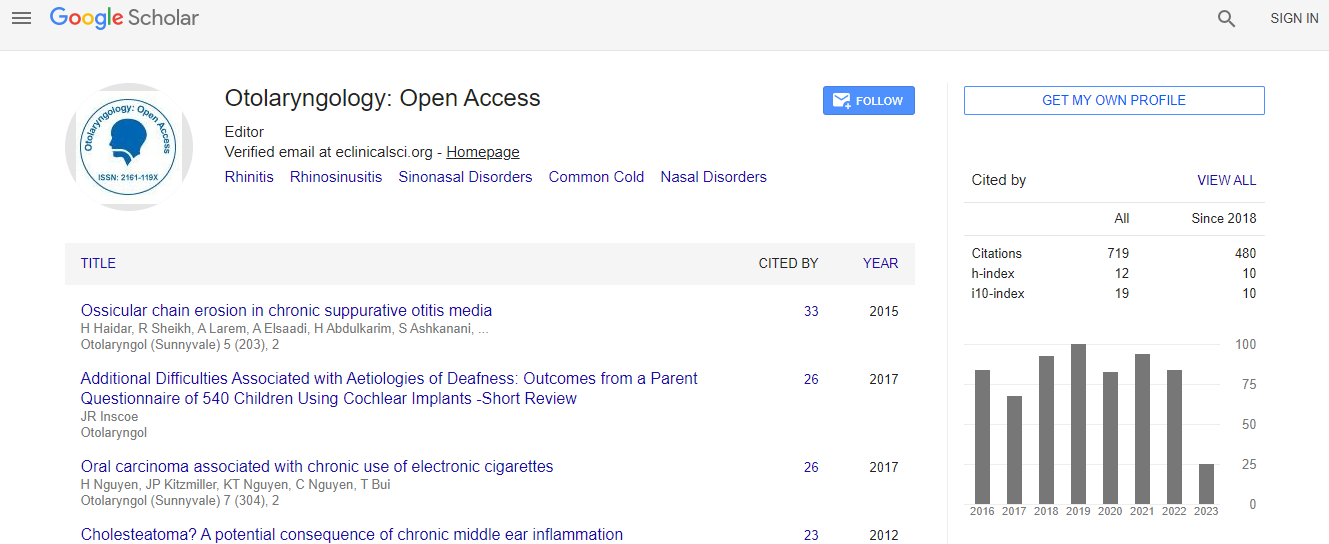Our Group organises 3000+ Global Conferenceseries Events every year across USA, Europe & Asia with support from 1000 more scientific Societies and Publishes 700+ Open Access Journals which contains over 50000 eminent personalities, reputed scientists as editorial board members.
Open Access Journals gaining more Readers and Citations
700 Journals and 15,000,000 Readers Each Journal is getting 25,000+ Readers
Google Scholar citation report
Citations : 925
Otolaryngology: Open Access received 925 citations as per Google Scholar report
Otolaryngology: Open Access peer review process verified at publons
Indexed In
- Index Copernicus
- Google Scholar
- Sherpa Romeo
- Open J Gate
- Genamics JournalSeek
- RefSeek
- Hamdard University
- EBSCO A-Z
- OCLC- WorldCat
- Publons
- Geneva Foundation for Medical Education and Research
- ICMJE
Useful Links
Recommended Journals
Related Subjects
Share This Page
Immunotherapy for allergic rhinitis
3rd International Conference and Exhibition on Rhinology & Otology
U Ayfer Yukselen
Gaziantep Children Hospital, Turkey
ScientificTracks Abstracts: Otolaryngology
Abstract
Allergic rhinitis represents a major cause of morbidity that includes interference with usual daily activities and impairment of sleep quality. The majority of patients respond adequately to pharmacotherapy, provided that it is taken properly and regularly. Nevertheless, a substantial proportion of patients report inadequate relief of symptoms despite treatment with intranasal corticosteroids and oral or topical antihistamines. Immunotherapy, both subcutaneous and sublingual, is an effective treatment for adults and children with severe allergic rhinitis that does not respond to conventional pharmacotherapy and allergen avoidance measures. It is also reasonable to offer allergen immunotherapy to those unable to tolerate pharmacotherapy. Selection of patients for immunotherapy requires accurate identification of an underlying allergic trigger through a combination of clinical history and skin and/or blood tests for allergen specific IgE. The efficacy of immunotherapy depends on correct patient selection, the type of allergen and the product chosen for treatment. The benefit of immunotherapy for AR triggered by perennial allergens, particularly HDM, is less well established than with seasonal allergens. The available data also suggests that immunotherapy may offer long-term benefits after its discontinuation, particularly where treatment has been continuously administered for several years.Biography
U Ayfer Yukselen has completed her Medical Education at Cukurova University Faculty of Medicine in 1990 and Education of Child Health and Diseases at Hacettepe University Faculty of Medicine in 1995 and education about Pediatric Allergy and Immunology at Cukurova University Faculty of Medicine in 2010. She is currently working in Gaziantep Children Hospital Clinic of Pediatric Allergy as an Associate Professor. She has published more than 25 papers in reputed journals.
Email: ayfyukselen@gmail.com

 Spanish
Spanish  Chinese
Chinese  Russian
Russian  German
German  French
French  Japanese
Japanese  Portuguese
Portuguese  Hindi
Hindi 
